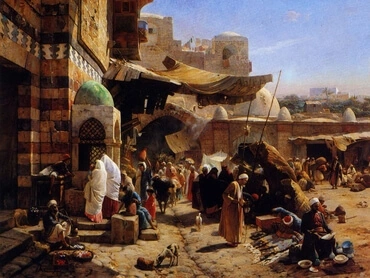1
Ora, o Senhor disse a Abrão: Sai-te da tua terra, da tua parentela, e da casa de teu pai, para a terra que eu te mostrarei.
2
Eu farei de ti uma grande nação; abençoar-te-ei, e engrandecerei o teu nome; e tu, sê uma bênção.
3
Abençoarei aos que te abençoarem, e amaldiçoarei àquele que te amaldiçoar; e em ti serão benditas todas as famílias da terra.
4
Partiu, pois Abrão, como o Senhor lhe ordenara, e Ló foi com ele. Tinha Abrão setenta e cinco anos quando saiu de Harã.
5
Abrão levou consigo a Sarai, sua mulher, e a Ló, filho de seu irmão, e todos os bens que haviam adquirido, e as almas que lhes acresceram em Harã; e saíram a fim de irem à terra de Canaã; e à terra de Canaã chegaram.
6
Passou Abrão pela terra até o lugar de Siquém, até o carvalho de Moré. Nesse tempo estavam os cananeus na terra.
7
Apareceu, porém, o Senhor a Abrão, e disse: ë tua semente darei esta terra. Abrão, pois, edificou ali um altar ao Senhor, que lhe aparecera.
8
Então passou dali para o monte ao oriente de Betel, e armou a sua tenda, ficando-lhe Betel ao ocidente, e Ai ao oriente; também ali edificou um altar ao Senhor, e invocou o nome do Senhor.
9
Depois continuou Abrão o seu caminho, seguindo ainda para o sul.
10
Ora, havia fome naquela terra; Abrão, pois, desceu ao Egito, para peregrinar ali, porquanto era grande a fome na terra.
11
Quando ele estava prestes a entrar no Egito, disse a Sarai, sua mulher: Ora, bem sei que és mulher formosa à vista;
12
e acontecerá que, quando os egípcios te virem, dirão: Esta é mulher dele. E me matarão a mim, mas a ti te guardarão em vida.
13
Dize, peço-te, que és minha irmã, para que me vá bem por tua causa, e que viva a minha alma em atenção a ti.
14
E aconteceu que, entrando Abrão no Egito, viram os egípcios que a mulher era mui formosa.
15
Até os príncipes de Faraó a viram e gabaram-na diante dele; e foi levada a mulher para a casa de Faraó.
16
E ele tratou bem a Abrão por causa dela; e este veio a ter ovelhas, bois e jumentos, servos e servas, jumentas e camelos.
17
Feriu, porém, o Senhor a Faraó e a sua casa com grandes pragas, por causa de Sarai, mulher de Abrão.
18
Então chamou Faraó a Abrão, e disse: Que é isto que me fizeste? por que não me disseste que ela era tua mulher?
19
Por que disseste: E minha irmã? de maneira que a tomei para ser minha mulher. Agora, pois, eis aqui tua mulher; toma-a e vai-te.
20
E Faraó deu ordens aos seus guardas a respeito dele, os quais o despediram a ele, e a sua mulher, e a tudo o que tinha.







